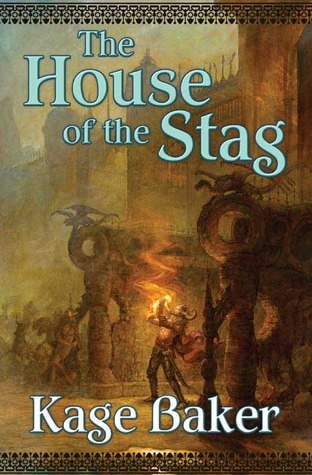What do you think?
Rate this book


350 pages, Hardcover
First published September 16, 2008
“But this is all absurd!”
“Isn’t it? I lie to survive, because people fear and respect a black mask more than an honest face. Life became much simpler once I understood that.” [p. 288]
This has been on my wishlist for ages, and was suddenly, briefly affordable...
Gard grows up in a close-knit family among a tribe of gentle forest dwellers, the Yendri. He's bigger and stronger than the other boys, and he doesn't believe in the divinity of the newly-arrived prophet. Then come the Riders, who enslave the Yendri: the prophet Beloved walks through walls, tending to the wounded and despairing, but Gard would rather fight back in more physical ways. He ends up exiled, and trying to climb the mountains beyond which lies a fabled promised land ... and finds himself, crippled by frostbite, prisoner and slave to a coven of immortal mages who employ hordes of demons to keep their Citadel running. Gard attracts the eye of the ambitious Lady Pirihine, Narcissus of the Void: he also befriends a number of demons, including the lovely, deadly Balnshik. Trained as a gladiator and then as a mage, Gard learns a great deal about the world and about his own nature. Then the Citadel is destroyed, and Gard turns to acting ... but his ultimate aim is to become a Dark Lord, with his own mountain stronghold and (obviously) werewolf valet.
Meanwhile the Yendri are flourishing under the care of a young woman known as the Saint, who is pure and compassionate and sensible. I am not comfortable with the circumstances of her first meeting with the Master of the Mountain... But on the whole (and despite slavery and genocide and rape and murder and some deeply unpleasant scenes) this is a cheering and gently humorous novel. It doesn't shy from the horrors of the world, but neither does it linger on them. Instead, it shows us people making the best of their situations: it shows us kindness and forgiveness, loyalty and just deserts, and a multitude of magics, from theatre to magecraft to the inner lives of demons. There were moments when I wanted to look away -- but more moments where I smiled, or laughed aloud, or reread a conversation just to relish Baker's humour. I wish she'd lived longer and written more.
I realised about halfway through that this was actually a prequel to The Anvil of the World, which I read nearly 20 years ago and now want to reread!